#letter never sent (1960)
Explore tagged Tumblr posts
Text
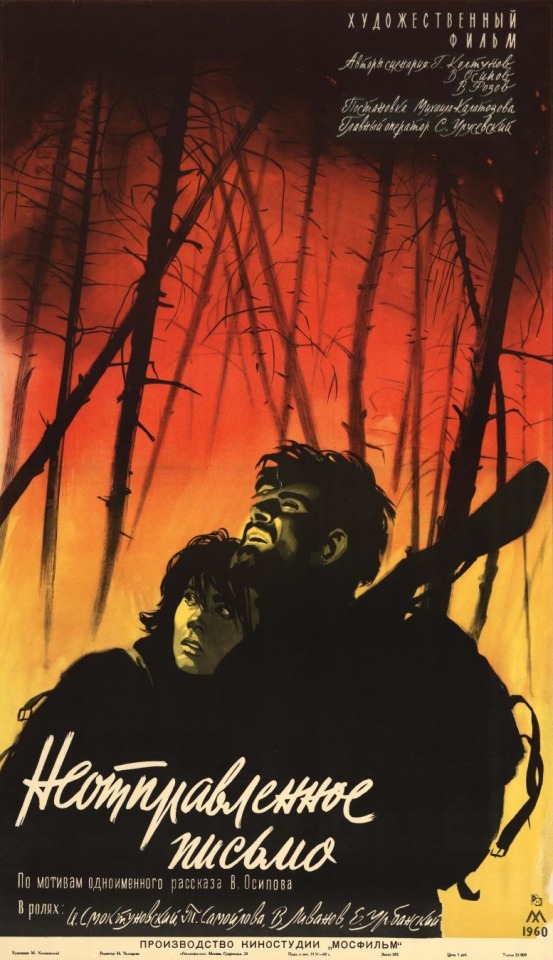
Mikhail Kalatozov’s “Неотправленное письмо” (Letter Never Sent) June 27, 1960.
#Mikhail Kalatozov#Неотправленное письмо#Letter Never Sent#1960#Sixties#Foreign#🇷🇺#Drama#Nature#Survival Drama#4/5
2 notes
·
View notes
Note
Regarding your comment in the tags about the portrayal of women in soviet films vs. in hollywood, I have read that russian/slavic women have historically been present in war in combat roles, which seems to be a cultural and historical difference that would perhaps explain that.
(I read it in The Great Big Book of Horrible Things by Matthew White)
Yeah, they were definitely in the World Wars -- famously, the Night Witches and Lyudmila Pavlichenko in WWII -- though tbh I couldn't speak to their presence before then. There's a bunch of interesting cultural stuff like that which goes towards explaining the Soviet perception of women and their ability to do physical labour & their equality as comrades. I'm no expert at all, I just think it's a striking thing to see in films when the US/the West was still firmly in their Damsel Or Minx period of portraying women onscreen.
#treepy talks#like both “psycho” and “the apartment” are from 1960 and don't get me wrong i love those films#but marion and fran are VERY different from tanya and her relatively unwavering strength (both mental & physical)#in the face of the disasters in “letter never sent”
1 note
·
View note
Text
What's Past is Past

Summary: After months of not seeing Bucky, you're sent on a mission together, faking your way through a marriage. But it doesn't seem either of you are ready for it.
Ex-Bucky-Barnes x Spy-Reader
The bustling city and towering skyscrapers fade into an endless stretch of flat road faster than you expected. You never thought your job would take you beyond New York-then again, you never thought you’d be fighting alongside Earth’s Mightiest Heroes.
For someone who consistently complains about subway delays and long for the fresh air your friends back home rave about, you’re surprisingly emotional about leaving. Even if it’s just for a month.
Maybe it’s because you always imagined that when you finally left the city, it would be with the man of your dreams behind the wheel.
But this? This is nothing like what you imagined.
Sure, you have a diamond ring on your finger and a good man by your side but it’s all fake.
You pass through the only street in town, where time seems to have stopped. Everything looks as if it’s been suspended in the 1960’s.
“It says the house is just up the road.”
It’s the first time in four hours that Bucky has spoken. He mumbled a broken hey when you got in the car, but after that, the only sound between you was the low rumble of the engine.
You hum in agreement.
The house is nice-it’s not what you would’ve choose for yourself, but it’s nice.
“I’m gonna get set up,” You don’t turn around as you step out of the car, heading to the trunk.
“Let me help you with your stuff,” Bucky opens it before you can stop him.
You grab your suitcase before he can touch it. “I don’t need your help.”
“I was just trying to be nice,” he mutters as you walk past him.
Inside, you set up your equipment, all facing south, toward your target: an ex-HYDRA assassin who’s been causing trouble.
In any other situation, Bucky would be the worst person for this mission. But your new neighbor has had his mind wiped so many times he probably can’t tell his left hand from his right. He’s trained to kill. And you can’t have that.
A few hours later, there’s a knock at your door.
“I was thinking of ordering a pizza. You want any?” Bucky asks, rolling his neck.
“No, thank you.” You keep your eyes on the screen. The faster this mission ends, the faster you can leave all this behind.
“C’mon, you need to eat.” He sighs, leaning on the doorframe. “You want your usual?” You freeze. “Don’t do that.” You try to sound firm, but your voice barely comes out as a whisper. “Do what?” Finally, you look at him-for the first time all day. His steel-blue eyes meet yours.
You’ve thought of this moment for months, ever since everything between you imploded. But not even your wildest scenarios compare to the real thing.
You thought you were completely over him, but the ache in your chest calls you a liar.
“Don’t bring up our past,” you rip your gaze away.
He throws his head back with a dry laugh. “Am I supposed to just forget that you like your pizza extra toasted? That your favorite color is navy? That you smile when the clouds turn darker?”
“Yes.” You snap. “You’re supposed to forget everything, that’s what you wanted-“
You stop yourself. “I can’t go down this road, Bucky.”
“Bucky?” He echoes with a scoff. “We’re back to regular names?”
That does it.
You let out an incredulous laugh. “Yes! We’re back to our regular names, because that’s what you wanted! Did you expect me to still call you Jamie when you dumped without so much as a goodbye?”
“You’re acting like you wanted me to stay?” Bucky crosses his arms. “Like I was the perfect boyfriend?”
You shake your head.
An amused look flashes through his face. “Are you saying I was better than the guy you’re with right now?”
“Bucky, stop,” you warn.
“C’mon,” he raises his eyebrows. “Tell me, who’s better.”
“Oh, you want a final review? Is that why you’ve been trying to contact me? So I can give you a letter of recommendation?” You roll your eyes. “Fine, here it is. You were a great boyfriend. Attentive, loving, gentle. Until you let your own insecurities eat you alive. I tried to help you, Bucky. But you wouldn’t let me.”
Your voice cracks.
“Then, you packed your shit and signed up for the longest mission you could find,” Your eyes prickle. “You left me. And I had to hear from someone at the compound that you’d already moved on.”
Bucky swallows hard, his eyes searching yours.
“So,” you clear your throat. “Overall, I’d give it a 6/10.”
Bucky opens his mouth to say something but you stop him.
“Let’s just get this mission over with,” you twist the fake ring on your finger. “I have someone to get home to.”
Authors Note: tbh idk what this is, I was just dyyyyinggg to write over here again! I've been MIA becauseeeee I wrote a book LOL. Nothing to do with marvel, sadly but I would love to know if anyone here would be interested in reading it. If so, please let me know in the comments so I can tag you when I upload the first couple of chapters on here!
Anywayyyssss thanks for the love and support! Don't forget to like, reblog, and comment. It helps out a lot! Remember: my asks are always open!
#bucky barnes oneshot#bucky barnes x you#bucky barnes x reader#bucky barnes#bucky imagine#bucky x female reader#bucky#bucky fanfic#bucky x y/n#bucky barns x reader#bucky barns x y/n#bucky barns fanfiction#bucky barns x you#james bucky buchanan barnes#james buchanan barnes#bucky barnes x y/n#bucky barnes x you angst#bucky barnes x reader angst#bucky barnes one shot#bucky barnes os#college au#college au!bucky barnes#bucky barnes fanfiction#bucky x reader#winter soldier x reader#winter soldier x you#sebastian stan x you#marvel fanfic
514 notes
·
View notes
Text






TATYANA SAMOYLOVA Letter Never Sent, 1960
#classicfilmsource#filmedit#filmgifs#classicfilmedit#worldcinemaedit#classicfilmblr#userlenie#uservita#userkayleigh#usermichi#uservienna#tuserfla#lalocorleone#ladiesofcinema#winterwake#letter never sent#татьяна самойлова#gifs
162 notes
·
View notes
Note
YEAH TELL US YOU ABE RANT :3
As requested:
Abraham Portman was a cruel man.
Firstly, he left Emma pining for literal decades while he led her on with promises that he would send for her after he had a home for them. I can forgive him for feeling that he had to go fight in the war for his parents, Victor, other peculiars, and whatever other reasons. However, the way he led Emma on was cruel and unnecessary. He could have cut things off so much earlier. He could have made it easier for her to heal from the heartbreak rather than allowing the wound to fester, rather than slowly away and starting a family while leaving the poor girl loop-trapped and pining. It's bad enough to lead somebody on for a few months, but for literal decades? That's another level of messed up.
Next is the fact that the family he created while leading Emma on barely saw him. He felt that he had a duty to help the peculiar children of America. Fine, I understand that, but to not even try to know your own children when you are home, to break promises you made to them, to needlessly traumatized one of them and then ask for said trauma to not be fully removed? That is majorly fucked up. That man is lucky he even got to meet his grandson, let alone have the bond he did with him.
That brings us to the many ways he screwed over Jacob. Let's start with the danger that he put him in by not telling him who he was while he was living in the fucked-up world that is peculiar America. Yes, Florida and the rest of the South are a semi-lawless zone with no central power (please correct me if I'm not remembering this correctly). But did he really think that Jacob would never leave Florida? This child that he fostered a love of adventure in, staying in Florida for the rest of his life? There is no plausible way that Abe believed that. Yes, he didn't plan on dying that soon, however; he knew that there was a risk. He knew that there was a risk of hollows and weights coming after him because of him being one of the hollow hunters. There was also the risk of the Five Boroughs clan coming after him because he pissed off Leo Burnham. He was intimately familiar with how the clans functioned and knew how serious they were about revenge, and yet he left Jacob unprepared and ignorant to the threats he could be facing. He may have left all those little clues scattered, but you don't exactly have time to pick apart a puzzle when your life is in danger. Then there's the ridiculously vague clues that led Jacob to Cairnholm in the first place. Are you really telling me that Abe couldn't have written his own letter and put it in the book with Miss Peregrine's letter? Just a basic overview of what Jacob might want to know to get to the loop in the first place and not feel like he's losing his mind?
Circling back to Emma, his reaction to her calling him was appalling. While I do not condone Emma's actions and her treatment of Jacob, Abe didn't know about that. She called from the 1960s (I think). That man didn't even know he had a grandson, and he definitely didn't know that Emma was messing with said grandson. Also, I may be wrong, or Ransom Riggs may have given us wrong numbers again, but I do believe that Abe was still leading her on at this point. I don't feel like getting the book to directly quote, but I remember her saying something along the lines of, "I waited so long that if I had gone with him I would have been forty." I do believe that puts us within the time frame for letters being sent. So this man leads her on, doesn't even question how he's calling since I doubt the Priest Hole had their one phone at this point, and is upset at her for calling because she interrupted dinner? He literally put them in this situation by not cutting things off once he realized that he wasn't going back to the loop OR when he realized he didn't actually want her to come build a life with him.
In conclusion, Abe was the true villain of the story, not Caul. Thank you for coming to my TED Talk inspired by a desire to procrastinate on the work that I still have not done. Let me know if I missed anything.
#mphfpc#miss peregrine book#miss peregrines home for peculiar children#abraham portman#abe portman slander#jacob portman#emma bloom
43 notes
·
View notes
Text










Letter Never Sent / Неотправленное письмо (1960) dir. Mikhail Kalatozov
97 notes
·
View notes
Text
The two copycats of the Zodiac Killer, Heriberto Seda and Shinichiro Azuma.
The Zodiac Killer is the pseudonym of an unidentified serial killer who murdered five known victims in the San Francisco Bay Area between December 1968 and October 1969. The case has been described as "arguably the most famous unsolved murder case in American history," and has become both a fixture of popular culture and a focus for efforts by amateur detectives.
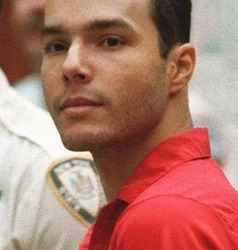
Heriberto "Eddie" Seda (born July 31, 1967), often referred to as The New York Zodiac or The Brooklyn Sniper, is an American serial killer who was active in New York City from 1990 through 1993. He fatally shot three people and wounded six others (four critically) before being caught on June 18, 1996.
Seda is believed to have admired San Francisco's Zodiac Killer for avoiding capture. Police described Seda, a Brooklyn resident, as a recluse obsessed with astrology and death. He was formally charged in the case on June 21, 1996, convicted on June 24, 1998, and sentenced to 232 years imprisonment.
Crimes & Victims.
Seda attacked people throughout New York City, sending taunting messages to the police and media after each crime. The messages included codes based on International maritime signal flags, which New York Post journalist Kieran Crowley decoded with the assistance of his father-in-law, a veteran of World War II cryptography and signals intelligence.
The killer's letters to police claimed that he was selecting his victims based on their signs of the zodiac and implied he would act only at certain times when specific stars were visible in the night sky. Police consulted a professional astronomer, whose predictions about when the killer would strike proved somewhat accurate. He used an improvised firearm, explaining in his messages that the lack of rifling marks on the bullets would prevent his capture.
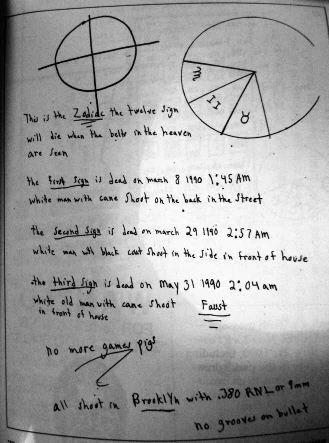
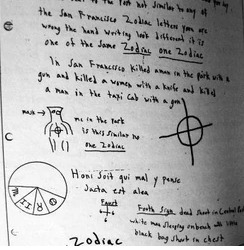
New York police considered the possibility that the notorious Zodiac Killer may have relocated to the East Coast and resumed his crimes after two decades of inactivity. In the late 1960s the Zodiac Killer murdered at least five people and injured another two in the San Francisco area. He sent taunting letters and coded messages to local media and was never identified. However, a handwriting analyst and consultation with California authorities ruled out that possibility.
1990: March 8: Mario Orozco, 49 (a Scorpio; survived; shot in the back) March 29: Germán Montenegro, 34 (a Gemini; survived; shot through the liver) May 31: Joseph Proce, 78 (a Taurus; shot in the kidney; died on June 24) June 19: Larry Parham, 30 (a Cancer; survived; shot in the chest) August 10, 1992: Patricia Fonti, 39 (a Leo; shot twice and stabbed 100+ times) - 1993: June 4: Jim Weber, 42 (a Libra; survived; shot in the buttocks) July 20: Joseph Diacone, 40 (a Virgo; shot in the neck) October 2: Diane Ballard, 40 (a Taurus; survived; shot in the neck) June 10, 1994: An unidentified man (injured) June 18, 1996: The attack at his apartment: Gladys "Chachi" Reyes, 17 (his sister; injured; shot in the back) Wilber Rios, 23 (Gladys's boyfriend; briefly held hostage) Several unnamed police officers (attempted; shot at them, but missed)
On June 24, 1998, Seda was convicted by a jury after a six-week trial presided over by the Honorable Robert J. Hanophy, Justice of the State Supreme Court for the County of Queens, New York. The case was prosecuted by Assistant District Attorneys Robert J. Masters and Raymond E. Scheer. The prosecution presented testimony of 45 witnesses and introduced 150 pieces of evidence. Seda was represented by court appointed attorneys David A. Bart and John S. Wallenstein. Seda was sentenced to prison for 232 years.
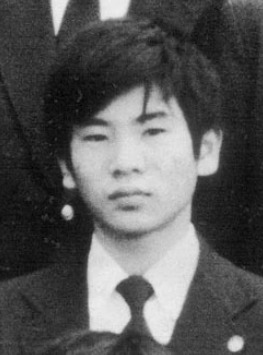
Shinichiro Azuma, Seito Sakakibara, The Kobe School Killer, Onibara, and Boy A, is a Japanese killer who used the symbol of The Zodiac Killer as his signature. For years, his real name remained hidden due to the serious nature of his crimes and the fact that he was a minor when he committed them (only 14 years old).
Crimes & Victims.
On May 27, 1997, the head of Jun Hase , a special education pupil at Tainohata Elementary School, was found in front of the school gate hours before pupils arrived for classes. Hase had been beheaded with a handsaw, with further mutilations being done before being left in front of the school, for students to discover when they arrived in the morning. A note, written in red pen, was found stuffed in his mouth, identifying the killer as "Sakakibara". The note read:
"This is the beginning of the game... Try to stop me if you can you stupid police... I desperately want to see people die, it is a thrill for me to commit murder. A bloody judgment is needed for my years of great bitterness."
Additionally, some misspelled English was on the note as well: "shooll killer".
Police commented that the style of Hase's killing and the note was reminiscent of that of the Zodiac murders in the San Francisco Bay Area during the late 1960s.
On June 6, a letter was sent to the newspaper Kobe Shinbun, in which Sakakibara (Shinichiro.) claimed responsibility for the slaying and decapitation of Jun Hase, and threatened that more killings would follow. This second letter, delivered in a brown envelope postmarked June 3, had no return address or name. Enclosed was a three-page, 1400-word letter, also written in red ink, which included a six-character name that can be pronounced as "Sakakibara Seito". The same characters, which mean alcohol, devil, rose, saint and fight, were used in the first message that was inserted into the boy's mouth.
Beginning with the phrase "Now, it's the beginning of a game", the letter stated that "I am putting my life at stake for the sake of this game... If I'm caught, I'll probably be hanged... police should be angrier and more tenacious in pursuing me.... It's only when I kill that I am liberated from the constant hatred that I suffer and that I am able to attain peace. It is only when I give pain to people that I can ease my own pain." The letter also lashed out against the Japanese educational system, calling it "compulsory education that formed me, an invisible person."
In the initial panic, the Japanese media misreported the name as "Onibara" – Demon's Rose, though the killer insisted it was as he gave it. Infuriated by the mixup, Sakakibara later wrote to the station, "From now on, if you misread my name or spoil my mood I will kill three vegetables a week. If you think I can only kill children you are greatly mistaken." (Sakakibara's use of the term "vegetables" here refers to people around him; he had learned this term from his parents, who had once told him, "if you are nervous at your athletic meet, picture the people around you as vegetables."
A 14-year-old junior high school student was arrested as a suspect in the Hase murder on June 28. Shortly after his arrest, "Boy A" also confessed to the murder of a 10-year-old girl, Ayaka Yamashita, on March 16, as well as the assaults of three other girls on and around that same date. After the March 16 attack, he wrote in his diary:
"I carried out sacred experiments today to confirm how fragile human beings are... I brought the hammer down, when the girl turned to face me. I think I hit her a few times but I was too excited to remember." The following week, on March 23, he added: "This morning my mom told me, 'Poor girl. The girl attacked seems to have died.' There is no sign of me being caught... I thank you, "Bamoidōkishin", for this... Please continue to protect me."
The meaning or identity of "Bamoidōkishin" remains unclear.
After the murders, Japanese politician Shizuka Kamei called for restricting objectionable content, stating, "Movies lacking any literary or educational merit made for just showing cruel scenes... Adults should be blamed for this", and that "(The incident.) gives adults the chance to rethink the policy of self-imposed restrictions on these films and whether they should allow them just because they are profitable."
21 notes
·
View notes
Text
relativity falls, but...
i've got a relativity falls brainworm. hear me out if u wish :D
relativity falls basically swaps the mystery twins (i.e. dipper and mabel) with the pines twins (or stans; i.e. Stanley and Stanford), right? Other characters like fiddleford and soos get swapped around too, but the main focus is the Pines.
so, imagine a relativity falls where dipper and mabel never had the chance to learn all the lessons they learnt during their summer in Gravity Falls. Mabel would never get over her fear of the future, or of Dipper leaving her. Dipper in turn would never understand the true meaning of trusting someone, or the importance of family, over everything else. They would never have a Stan and Ford as examples of what they shouldn't do, and they'd be stuck in Piedmont with their arguing parents --- parents, mind you, who argue so intensely that it gives Dipper nightmares.
Let me remind you that this kid survived an entire apocalypse, got thrown off a cliff, nearly died (multiple times!) and got possessed by a demon with powers and motives far beyond his comprehension, yet out of all these traumas, the one that hits the hardest is of his own parents. Whatever Dipper and Mabel's parents have got going on, it's inching into 'divorce' territory.
Everything might turn out well enough in canon, because it's 2012 and no one cares if a couple decides to split up, but it's not so great in the 1960s, which is when Relativity Falls-Dipper-and-Mabel are from. Not just because of prejudice and stigma, but also because it's a lot harder to raise a kid by yourself than it is with a partner, especially in an era where a woman couldn't do much without the permission of her husband (like open bank accounts).
What does this mean for the au, though? It means that Dipper and Mabel couldn't escape anywhere for the summer, no Mystery Shack, no Grunkle Stan or Soos or anyone to seek comfort or stability from (unless you count Shermie, but considering that their parents would rather send them to a great uncle they've never met than their own grandfather means that either he's dead or incapacitated in some other way).
Imagine Dipper and Mabel stuck in the house, possibly hiding under the bed or trying to distract themselves from the arguments going on downstairs. Imagine Mabel trying to sing or talk loud enough to block them out, or Dipper daydreaming about ways that they could leave the house for good (were they strongly attached to their parents? probably not. These two spent three months at their great uncle's house and not once mentioned them apart from one stray letter from Mabel --- not even during an apocalypse, which would literally be the best scenario for a kid to miss their parents).
Basically, just imagine Dipper and Mabel taking care of each other when it seems like their whole world is falling apart, because who else could they rely on? Who else could they possibly choose in the lowest points of their life, other than their own twin?
And sure, this behaviour between the two probably continues for most of their childhood.
But then comes high school.
Neither Dipper nor Mabel referenced any friends back in Piedmont. Candy and Grenda were the only people that Mabel ever called "best friends", and she never sent any letters or postcards back to any other friends she might've had there. Heck, just hanging around Dipper probably shot her social status to the lowest possible point, but she doesn't care, because he's her baby brother and she'd much rather take him than anything the popular life in school could offer. Point is, Relativity Falls-Mabel never had a Candy or Grenda, because she never went to Gravity Falls for the summer. She is inexperienced with having any real friends other than her twin brother.
One eventful summer, just before the start of high school, the twins' parents seem to momentarily get over themselves and book a trip to the beach for a few weeks or so. Mabel has a short-lived romance with a merman named Mermando (to whom Dipper was, at first, very sceptical about). The trio eventually form a friendship, however, and promise to meet each other every so often. This is when Dipper truly becomes interested in anomalous phenomena. He wonders that if mermaids/mermen are real, does that mean Atlantis is too? What about ghosts? Zombies? Fairies?
The trip goes well, all in all. Their parents may avoid each other, but at least they're not fighting.
...The truce comes to a crashing halt when they return home, but hey, at least they had a small bout of peace and quiet.
Dipper knows what he wants to do with his life now. Study weirdness with his twin sister, living together and having adventures every day. Mabel supports this idea, citing that they should go find Atlantis as their first big adventure. Living in Piedmont (which was partly rural in the 1960s, as far as my Australian brain knows from a short and unclear Google search), they don't really have the chance to have a Stan O' War or big adventures on the beach. Weirdness doesn't tend to stick to suburbs, but the two try to find stuff anyway. Maybe they end up finding a rogue gnome or a bunch of ghosts in the local cemetery. Maybe they spend hours frolicking around fields of grass and rolling down hills and whatnot.
When high school arrives, Dipper sees a great opportunity. If he could utilize his smarts, bring home grades that were practically teetering on the level of too high, then he and Mabel could leave the house. They'd go to a good place far away, maybe back to the beach, and live together and go on adventures and possibly find Atlantis for real. He throws himself into studying to carve the best possible life for him and his twin sister (he's kinda like Stan in that way: always thinking of Mabel before himself).
---But in doing so, he buries his nose into books and papers and other school stuff, and spends practically all day holed up in the school library. When he returns home he's tired and spent, and usually just keeps studying and studying without a thought on the potential health risks, before leaving again at dawn the next day.
He believes it's for the greater good of them both, but he neglects their mutually-reliant relationship in favour of a better future.
At first, Mabel tries to go with it, really. She becomes Dipper's rock, pulling him back when he pushes himself too hard, forcing him to eat and properly sleep. She's silly and funny and stops him from becoming all gloomy and sad during those times when their parents can't seem to stop screaming at each other. She tries to look over his homework and see if he's having trouble, but she can't for the life of her understand what the heck he's working on.
As their final year of high school approaches, Dipper knows that he has to go all in. Eventually Dipper stops coming home entirely, turning up just before dinner or even sometimes skipping it. He either goes to the public library after school or periodically forgets to go to their mutual lunch table and actually eat, but his grades are consistently off-the-charts, because he knows he has to keep going for Mabel.
And while this is great for Dipper and his vision of the future, Mabel... doesn't see things the same way. She dislikes how studying has taken hold of her brother's life, and the way that he disappears for hours on end places her directly in the path of bearing the brunt of their emotional trauma from their parents. She becomes less cheerful and begins to foster an irrational fear of the future, where she believes her brother will leave her behind in favour of studying all those weird creatures he was so obsessed with.
She becomes vulnerable, and a particular group of predatory teenagers... pounce.
With Dipper mostly absent from her life, she is approached by a group of popular kids who, for all intents and purposes, appear to be genuinely looking out for her. For the first time in her life, Mabel can actually interact with people her age without the looming shadow of her brother's general social allergy over her head. She becomes friends, regains her cheeriness and is able to move past her trauma, because now she actually has people to share it with, not just a twin brother who's suddenly started practically disappearing from their home.
It starts off slowly, but those teens begin to make off-handed comments about her brother. Small things, at first, like how he's ridiculously smart, how he's going to be very successful. Mabel wholeheartedly agrees, of course, and doesn't think much of it.
The comments escalate after a few weeks. Stuff like how geniuses like Dipper didn't need anyone, how their intellect would carry them far and how could someone like Mabel hope to compare, really?
Basically, they feed into her innermost insecurities. They isolate her from her family and her twin brother (not that he made it hard). They tell her that Dipper doesn't need anyone, doesn't need Mabel, and the only way to make something of herself is to do favours for them, and maybe they'd help her in return.
Mabel, having being fed lies for the better part of her last years of high school and not having any healthy friendships to compare, believes them. She falls in with the "wrong crowd", so to speak, but doesn't realize what's going on. Sometimes she delivers strange packets to other high school students or other shady stuff, but the teens help her catch her brother after school and they spend time with her, so maybe it was worth it in the end. Other times she wonders what she's doing, and tries to peek at the contents of the bags, only for the teens to find out and threaten to end their friendship, citing that "true friends trusted each other" and that Mabel "needed them".
Mabel, in her poor, desperate attempt to have someone to talk to, begs for forgiveness and vows never to doubt them again.
And then the science fair happens.
Dipper creates a perpetual motion machine and, for the first time, is so excited that he can't focus on his studies. He's won plenty of competitions over the years, but this is the one that could possibly guarantee them a ride out of Piedmont, so he's very meticulous in the preparation for the machine's reveal. The principal calls him into his office and Mabel lingers outside, hearing how the scouts of a prestigious college (West Coast Tech) were coming to see Dipper's project tomorrow. Their parents, for once, seem to come to an agreement: Dipper was brilliant. Possibly brilliant enough to rival world pioneers.
And then they argued whether who he took after, and how once he'd made millions, he'd support them more than the other, because of course they were the favourite--- as expected, anyway. Dipper's somewhat surprised that they remembered to show up to the meeting in the first place. He'd take anything he could get, at this point.
But something niggles at the back of his mind.
Dipper interrupts as the principal waxes poetic about his project and inquires about Mabel. The principal waves him off, saying that at this rate, the girl would be lucky to find a waitressing job nearby, much less a full ride to a prestigious college.
Mabel, eavesdropping outside, immediately becomes upset and runs off, not hearing the way that Dipper defended her, because of course he would. In the end, Dipper storms off, saying that he'll just have to take her along with him, then.
He later shares his plans with Mabel and blabbers on about how the great the perpetual motion machine was, how it was the crowning achievement of his efforts to get them away from their parents, but all Mabel hears is the thundering of her heart, panicking at the thought of Dipper leaving her behind (and yes, it's irrational, but remember, she's been in a toxic relationship with several people who cracked open her small insecurities into gaping wounds, that neither of them acknowledged or sought to heal).
Mabel seeks out the teenagers and does a few more deals with them, begging them to do something that changed the course of their lives, because to her, it's getting increasingly clear that Dipper's going to leave and she's powerless to stop him.
The teenagers toy with her for a bit, but concede. They break into the science fair room and trash the project, but not before leaving a pack of glitter sprinkled over the broken thing, just to mess with Mabel and Dipper's relationship a little more.
Of course, Dipper doesn't take that realization well when he shows up the next morning and stares at a ruined machine, glitter coating it inside and out. He's devastated, but also angry that Mabel would ruin their only chance to get away from Piedmont, and doesn't understand why she would do such a thing.
He confronts her about it and she admits to breaking it. She could never blame the teens, of course, but especially not when she'd asked them to do the deed.
Dipper tries to understand, but his anger gets the better of him and they devolve into a shouting match. They never did learn how to communicate properly. He says some things he normally wouldn't, and Mabel does the same. It's a frightening parallel of their parents, and it ends up with Mabel running away from home as a last ditch defense mechanism (just like she did in Dipper & Mabel VS the Future).
(Welp, that's all I have energy to write today. Prolly will make a Part 2 of this tmrw). Hope it was somewhat in character? Idk. Might write a full-fledged fanfic on this later.
BTW, major thing here: this is just what I think of Relativity Falls. I don't own the idea, nor do I own the characters. I'm just a person who overthinks on the lives of fictional characters. Also someone who has semi-unwillingly started down an unending spiral of Gravity Falls brainworms that refuse to leave unless I write those suckers down.
Part 2 is up!
#relativity falls au#gravity falls#dipper pines#mabel pines#mystery twins#wordvomit fr#my take on relativity falls#might be ooc#might not#idk
33 notes
·
View notes
Text
Sandy May Not Have Cheated on Soda
Y'all ready for another hot take?
I'm not saying it's likely, but it IS feasible that Sandy didn't cheat on Soda. I'm not saying she wasn't pregnant when she left- that's textual- but no where in the text does it explicitly say that Sandy cheated. It's implied, heavily, by Steve 1. and Darry 2., but never once is it explicitly said out loud. Additionally, Ponyboy remarks multiple times, that to his knowledge (and Soda's) Sandy really seemed to love Soda. Her blue eyes 'glowed' when she looked at him. Now, I know Ponyboy's narration is biased, and this could be read as part of his innocence and naïveté, but it could also be the truth. Sandy being shipped off to Florida to live with a relative was not uncommon for a teenager pregnant out of wedlock during the time period, but it was still a pretty swift and abrupt exit, especially since Sandy (presumably) wouldn't start showing for a while. It seems a little suspect to me. There's also the fact that Sandy wouldn't marry Soda. Now, I know the book says her parents took issue with it, but we know Sodapop is definitely the type of impulsive and romantic that he would be more than willing to steal her away and marry her anyway; but Sandy left and she sent his letter back unopened, so she clearly wasn't on board with that plan. The explanation of cheating is one that fits here to explain this away, but I'm not so sure. If I'd been sixteen and pregnant in the southern US in the sixties I'd probably have jumped on the chance to marry my handsome and devoted boyfriend, a guy so loyal he was willing to marry me even if I was (allegedly) pregnant with someone elses kid. yeah, Soda is poor but Sandy grew up poor and Soda had a full time job and a desire to make it work. Maybe Sandy is just a better person than me, or maybe there's a deeper- and darker- explanation at play here. Sandy was a lower class woman in the 1960s, and canonically doesn't come from a 'great home'. Knowing that the majority of teenage pregnancies involve a father who is an adult man, it stands to reason that there is a possibility that Sandy was raped or coerced into sex, and that the shame and trauma associated with that experience and the subsequent pregnancy were what led to her dumping Soda without a sufficient explanation and letting him draw his own conclusions, or lying about cheating either because she may have felt like she did after the assault or because it was easier than confessing what actually happened. She also can't have been the only east side girl to have gotten pregnant out of wedlock, and for all it would have damaged her reputation it may not have been irreperable in Tulsa. But rape victims are still stigmatized even in today's society, and it would have been a thousand times worse back then. If word got out, Sandy would have been a pariah. Maybe a fresh start in Florida and a chance to reinvent herself seemed better than any possible future in Tulsa.
Again, I'm not saying it's likely but it is POSSIBLE and definitely food for thought for a fandom that consistently demonizes Sandy without ever attempting to look deeper into her character.
"Look," Steve said, surprisingly angry, "does he have to draw you a picture? It was either that or get married, and her parents almost hit the roof at the idea of her marryin' a sixteen-year-old kid." (The Outsider, 1967).
2. "When Sandy went to Florida… it wasn't Soda, Ponyboy. He told me he loved her, but I guess she didn't love him like he thought she did, because it wasn't him."
47 notes
·
View notes
Text


What is your favorite part of the '68 Special?
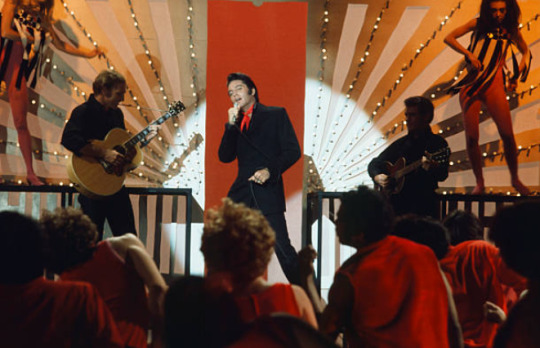
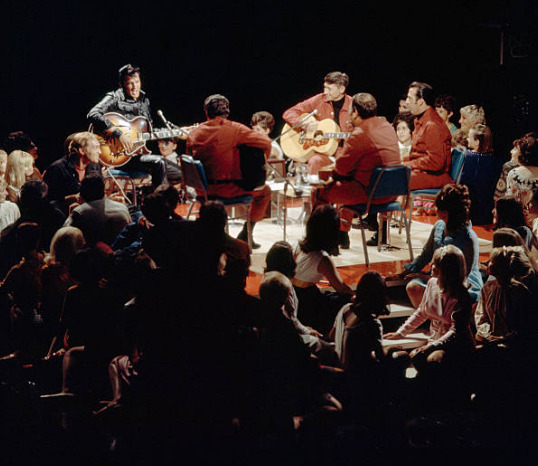
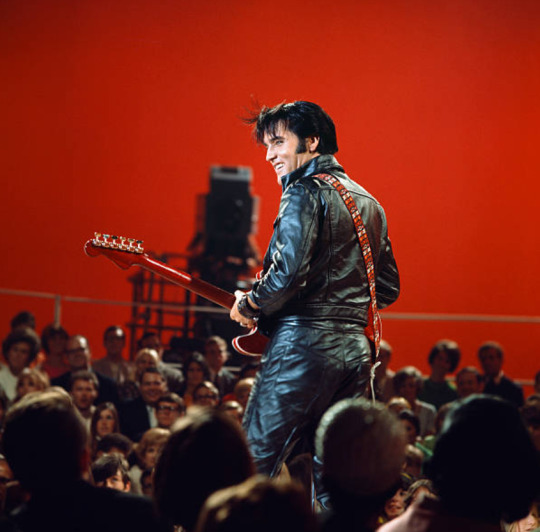
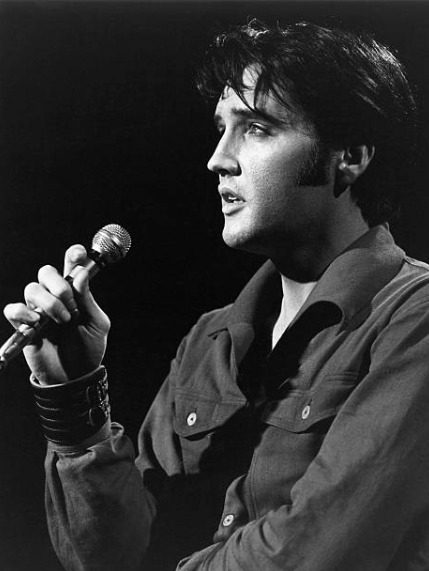
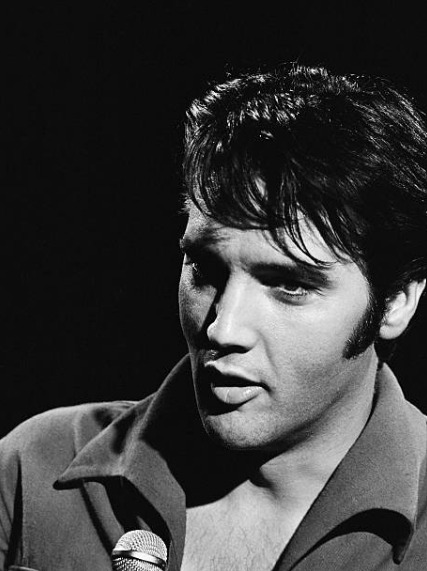
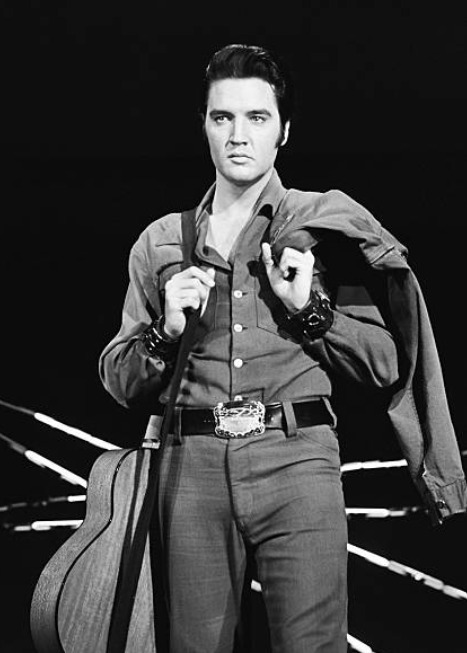

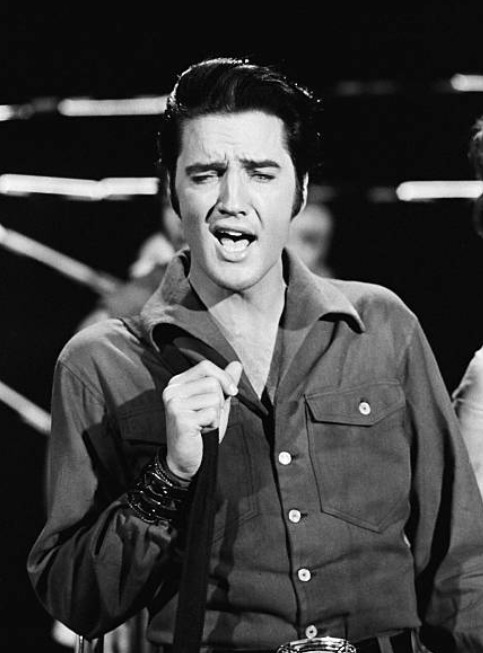
Pictures: Singer Presents ... Elvis, commonly referred to as the '68 Comeback Special. 1968.
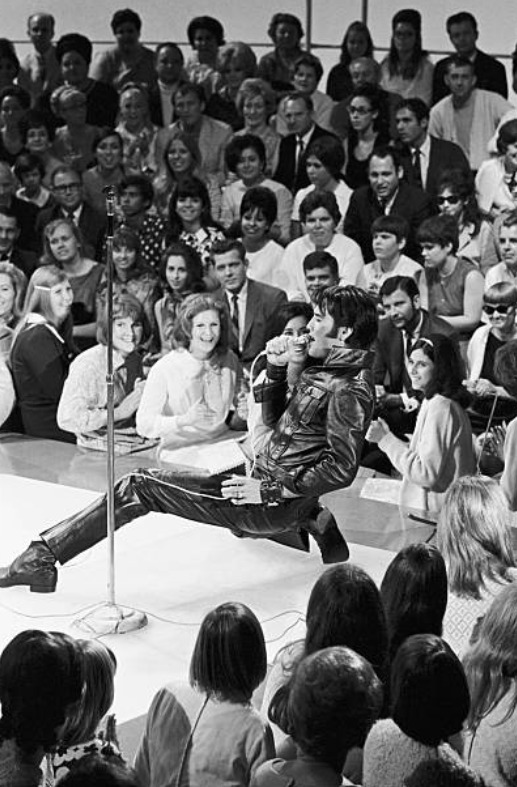
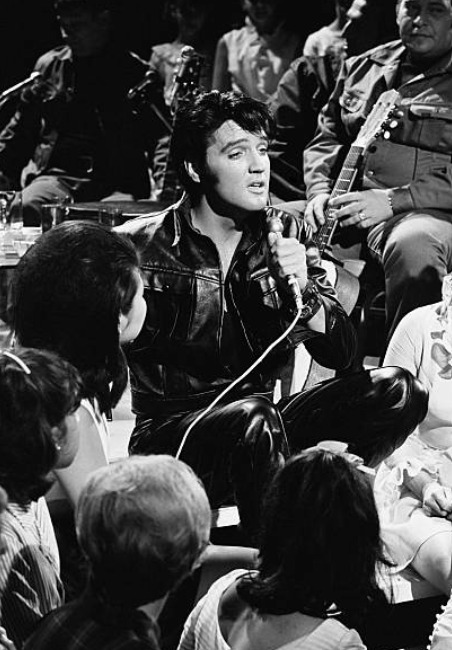

For me, undoubtedly I say my favorite part of the '68 Special is the sit-down concerts, specially the reunion between Elvis and the remaining members of Elvis' former band, the Blue Moon Boys, Scotty Moore and DJ Fontana.
I wonder if the fans, not the specialized critic such as musicians and general people in the business but specially the fans, back then, while watching this TV special for the first time, understood or merely felt the significance of this moment. I wonder if they were surprised in seeing Elvis not only back onstage after a while but back onstage with Scotty and DJ Fontana by his side. Man, that was special! To me, the most special portion of the '68 Comeback. ♥
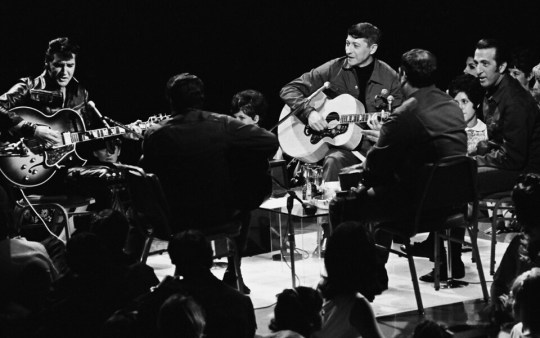
Bill Black, bassist, unfortunately passed away in 1965, while Elvis was still full time engaged with his Hollywood career. Fans only wish Bill could have been there with Scotty and DJ. He had that irreverent performance that fascinates me, surely he would've been a great asset to the show. I only feel sorry Elvis, neither Scotty or DJ, ever mentioned Bill on the '68 Special, but its understandable the reason why. It wasn't about the Blue Moon Boys more than it was about Elvis returning to the stage. Even so, had Bill made it to this moment, man! That would've been something else. Even more meaningful than it already was.
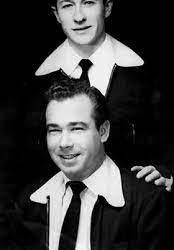
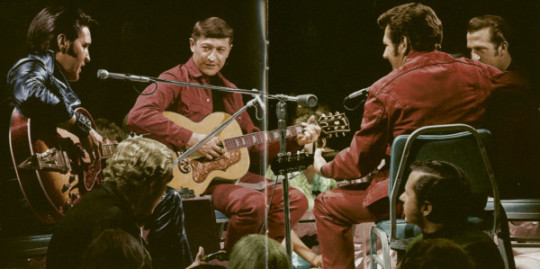
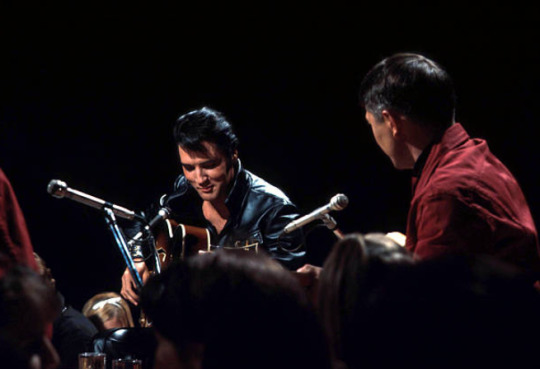
Scotty Moore: His memories on the '68 Comeback Special and 'behind the scenes': Elvis and The Blue Moon Boys performing in Europe?
Source: Excerpt of the documentary "Elvis: The Birth of Rock n' Roll" (2004)
Scotty reveals Elvis asked him and DJ Fontana if they would agree to go on the road with him again, this time performing overseas, in Europe. Curious enough, to that question, Scotty says Elvis called him and DJ Fontana to another room in his home, so they could talk in private - which was something unusual for him because "usually anything he had to say, he'd say no matter who was around".
For the longest time, performing around the world was something Presley aimed. Ever since he had been stationed in Germany with the US Army during his service time, a period he did paused his career therefore he didn't perform while in Europe between 1958 to 1960, reporters asked him if and when that moment would come when Elvis would go back to Europe but this time for live concerts, to the thrill of his passionate fans overseas who followed him career from afar, many since the 50s. Unfortunately touring outside US (other than few performances in Canada in 1957) never seemed the get the right time.
Once Elvis begin performing live again in 1969, after he was out of the movie contracts, Elvis' manager, Colonel Tom Parker, would always have excuses on the tip of his tongue for why an European tour, or world tour for that matter, would not be a such good idea. When Elvis received some death threats coming his way through letters sent to his crew occasionally, starting from 1969 on, those incident perfectly fit to Colonel Parker's intentions for his gold boy. Parker would use the incidents to manipulate Elvis to believe they couldn't do his security properly out of the US. Colonel would tell Presley how it would be too dangerous for him, besides they could make just as much money performing home as they have been doing so far.
Elvis never had this one dream of performing overseas coming true in his life, as much as another reunion between him and the Blue Moon Boys never came to be after the '68 Comeback Special. Scotty says that private conversation in Elvis' home (in 1968) was the last time he was together with Elvis like that, which makes this moment in history one of a kind.
youtube
During the '68 Special (sit-down concert), Scotty submits a special request to Elvis for them to play "Lawdy Miss Clawdy" together.
The song was recorded by them on February 3, 1956, at RCA studios in New York. It was released as B-side to the EP "Elvis Presley", out in September 1956. The cover shows Elvis, Scotty Moore and Bill Black performing together.
Later, the song would be featured on the LP "For Elvis Fans Only" released in 1959. Elvis would frequently include "Lawdy Miss Clawdy" to his main setlists from 1970 to 1975, occasionally performing it in 1976 and 1977.
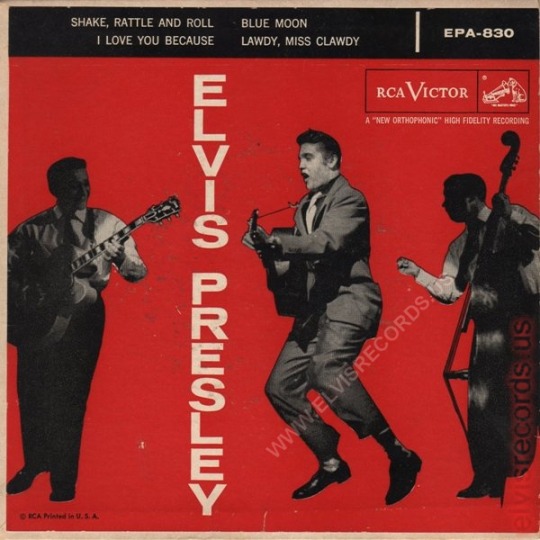
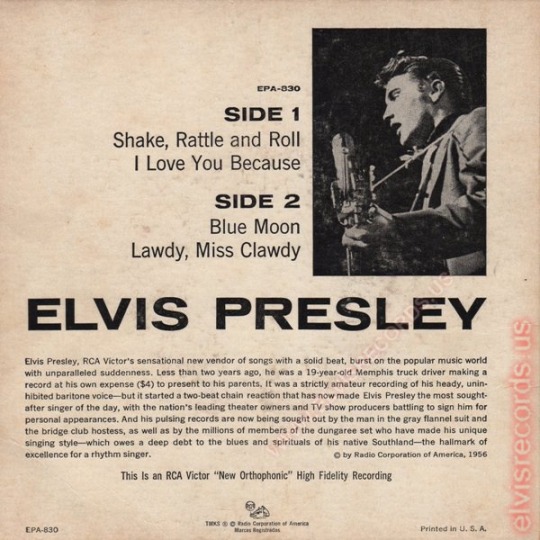
No wonder Scotty picked this song. Maybe a subtle way of honoring late Bill Black. ♥
About their performance of this tune during the '68 Comeback Special:
As they jam together, Scotty gives a cue and Elvis tears into “Lawdy Miss Clawdy” with a raw assault of mixed emotion. His performance is so intense that it almost—in the best way—scratches the ears. Vocal cords that, so far, have proved their owner’s mastery with smooth singing are pushed to the point of fraying at the edges. As Greil Marcus noticed, when Elvis lurches into the number, what he experiences is a feeling that is both joshing and liberated. At one point, as the musicians jam together, it’s possible to hear Charlie Hodge getting carried away with laughter, as if bobbing in the fray of a heady, almost oceanic moment. In his underrated 2004 pocket volume The Rough Guide to Elvis, Paul Simpson describes “Lawdy Miss Clawdy” as “Elvis’s answer to Jack Kerouac’s On the Road.” Taking on this old staple in the Comeback, what the singer delivers is lusty, passionate, and commanding, yet also desperate, angry, and sad. He conjures with immense powers. — Mark Duffett (Counting Down Elvis - His 100 Finest Songs, 2018)
youtube
Again, what is your favorite part of the '68 Special?
#68 comeback special#elvis presley#elvis#elvis the king#elvis fans#elvis music#elvis fandom#elvis history#60s elvis#NBC#60s tv shows#60s tv#scotty moore#the blue moon boys#DJ fontana#Bill Black#rock and roll history#Youtube
101 notes
·
View notes
Text
Snowballs and Kisses
Hello darlings!! Merry Christmas! I hope everyone celebrating has a wonderful day, and everyone for whom it is a usual monday has a better than usual start to the week!!
I have been MIA the last few weeks on here, but never fear I have been busy behind the scenes and hopefully more things and fics will be finished very soon!! I cannot wait for my little new year break, and *finally* catching up on all the stuff I've missed!! In the meantime as a ittle teeny tiny Christmas gift please enjoy this timeskip for my Splashing Around ‘verse to Christmas Eve 1960 and my shameless OC self insert of what I’d like to gift Elvis.
a/n not totally accurate weather references: it didn’t actually snow in memphis in the latter half of 1959 but, this is fanfiction after all and it *was* very cold november 18th 1959. (I also cut a whole 4k of angst that will come out at some point as a separate chapter, Anita getting a poodle, and the colonel dressed as santa because honestly i just wanted to write and read fluff, but here's a warning that there may end up being more festive fics posted…a little late).
warnings: 18+, smut lite; gentle fingering and references to cumming in pants. UNEDITED
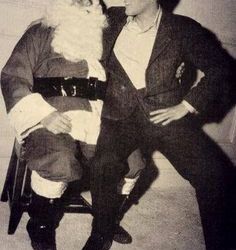
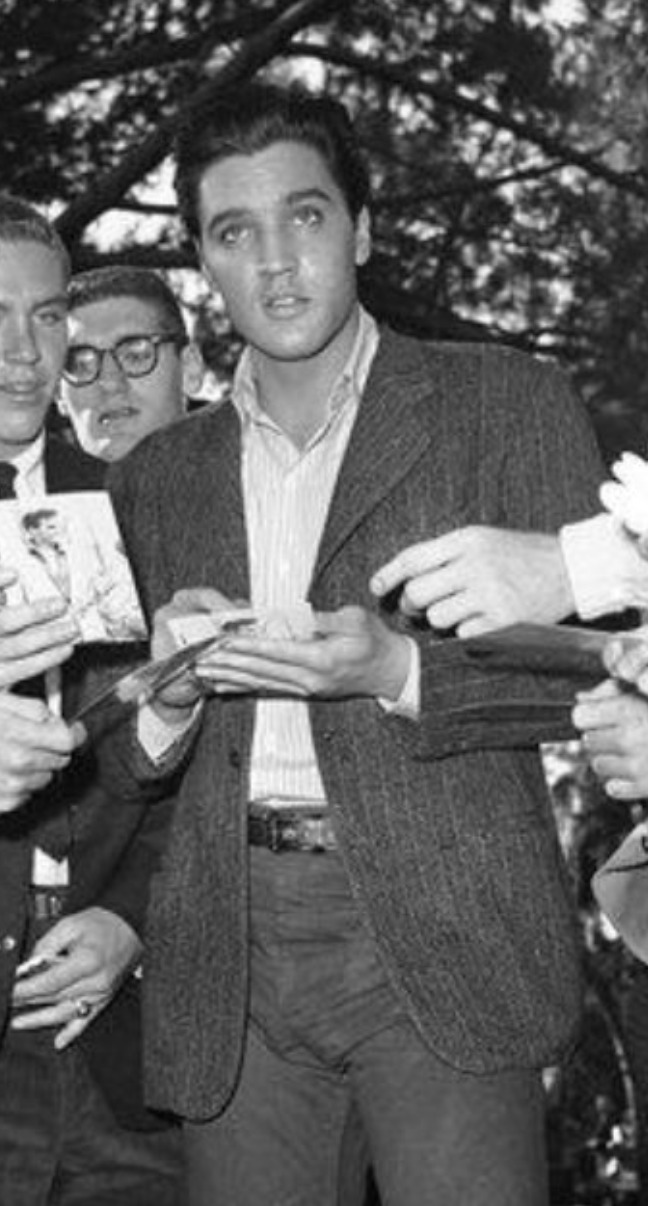
Graceland - December 1960
The excitement of having Elvis back at home for the festive season was only slightly tempered by the knowledge that it was his first Christmas at home without his mother. He’d not really tried to celebrate properly in Germany; sure they’d done the best they could, and he raved about the gift of a fully dressed tree for weeks, but it hadn’t been the same as it would have been at home.
This year though, Elvis seemed determined to restore the festive spirit. Perhaps even further than just restoration - an attempt to make it as bright and jolly as possible in response to both his mother’s passing, and missing the last two. He’d bragged to anyone who would listen about how excited he was to give out presents, his plans for even more lights than ever before; signs and lawn decorations.
While Louise was excited, it had left her in an almost constant state of anxiety, Christmas wasn’t just about the gift-giving… but it was a large enough part of it that it’s where her mind immediately went. From the moment he suggested they hang at Graceland that first year, from the first time they’d all pored over the letter to Frances, and his promises to “have a ball next Christmas”, giggling and whispering about what fun they were going to have the following year. From all of those times Louise had been preoccupied with what to get him and whether her secret plan was good enough for Elvis of all people.
That first year he had reiterated to them all and was absolutely adamant no-one needed to gift him anything and wouldn’t hear of anything being sent over to him. But his frequent calls and mentions of the upcoming holiday belied his actual feelings and besides, Louise wanted him to feel special. Wanted him to know they’d been thinking of him as much as he must have missed being home. It wasn’t until the 27th of November and the slightest of snowfalls had occurred, tiny little snowflakes, delicately falling down when the temperature had dropped just enough for the rain to crystallise when a flash of inspiration hit her. She couldn’t send it, so instead she’d waited patiently, adding to her bundle throughout the months. Now that it was almost time to give it though she was second-guessing that two year decision. Was it too juvenile? It’s just so tricky to buy for the man who literally has anything he could ever wish for. As the festive period hurtles on she resigns herself to having to hunt for a back-up gift…maybe a nice sweater. Maybe that will do. Or maybe it’s best to have options.
Elvis’ melancholia about the holiday doesn’t seem to stretch into Christmas Eve, and he encourages them with all the enthusiasm he’s ever had. The party starts from mid-afternoon and stretches long into the evening and night with all the makings of an excellent time from the music to the food until eventually they all find themselves around the extravagant tree to exchange presents. It’s a little chaotic, so many people about and frequently someone’s having to dive from room to room to fetch people or hidden gifts. Louise finds it almost dizzying when she finally manages to take a seat on the long sofa, catching her breath from being sent to find someone. She was already finding herself struggling to think whenever she glanced over at Elvis - he looked outrageously good in a white shirt, black trousers - well, he looked outrageously good all the time at the moment - but there was something about the feeling in the air of the day that made it all the harder to act natural around him. Elvis had been quiet for a moment, but now he was sat on his armchair across the room, looking for all the world like a king on a throne ready to bestow his generosity on the peasants. Except, that’s not the feeling in the room at all; it’s jolly and wonderful, picture perfect - all of them slightly tipsy on champagne and vodka cocktails and finding the evening all the more entertaining for it. He announces he wants to give the presents that he’s bought everyone before he opens his own, and Louise dips her eyes when he hands her a little bow-tied box. No-one else’s comes with a ribbon and she strokes it, feeling a glow emanating from her stomach and chest as she imagines his nimble fingers tying it on, totally ignoring the fact that she knows someone else probably wrapped it for him. Still, she tugs it off to hide from the others - not wanting to be teased about how such a little gesture has made her blush so strongly - and tucks it into her palm, fully intending on slipping it into her shoe or around her wrist in a moment, knowing she’ll keep it forever - wear it in her hair like a declaration.
When she looks back up everyone has a similar box and she opens it quickly in case they’re all the same - she doesn’t want to ruin her surprise. There, nestled in a little velvet box is a ring, a huge, gaudy red stone in the centre, almost too big for her finger. Louise is transfixed, staring at it, barely a thought in her head as she tries to wrap her head around the way it sparkles in the light. Despite the size of the gem, the band was more than a little small when she tries to slip it on, and she quietly puts it back into the box, not wanting to draw attention to her apparently larger than expected fingers. She glances around, suddenly coming out of her shocked obliviousness. Her face falling when she realises that everyone around her is unboxing similarly precious jewellery. She’s resigning herself to having to sneak it off to get it resized and hating herself a little for it, wondering if there are exercises she could do or maybe a special diet to shrink her fingers to size, when she suddenly realises all the other girls are turning each-other around, kissing Elvis on the cheek in thanks, or asking him to clasp their new necklaces. Louise looks back down at her box and the others. What does a ring mean? It’s been gifted with such casualness that it can’t possibly mean anything can it? When she looks back up Elvis is staring right at her, and she makes eye contact with him - her wide eyes meeting his laughing ones. He winks, and turns back to Red. She tries her best to distract herself from it, ooh and aahing over everyone else’s and keeping quiet about the little box clutched tight in her hand.
Half hour later Elvis is admiring his own little haul, when he catches her eye again,
“You forget about me Lou?” Louise cringes at being called out so publicly,
“Of course not!” She looks around the room, at the large group gathered there, “No, uh, why don’t you, well I’ve gotten you something else….It’s a sweater. It’s not great really, but I… your real gift I’ve made you, but,” She swallows building her courage, unsure why she’s so nervous suddenly when she’d been so excited for so long; the whole idea just seemed juvenile and silly now. “… you’ve gotta follow me for it.” He stares into her eyes for a second, before nodding and standing up, gesturing at her as if to say ‘lead the way’.
He grins at the boys when they walk out, making a salacious movement as if to suggest her gift may not be all too family-friendly to accompanying guffaws of laughter. She ignores it, even as her tummy churns; should she be offering that? Is that what he wants these days?
“Don’t laugh.” She asks nervously as they walk into the little pantry. Elvis looks bemused to find himself there, leaning against the wall of the tiny space
“I won’t” Louise nods, shutting the door, only to hear Elvis giggle, “You tryin’ to get me alone, doll?”
“You said you wouldn’t laugh!”
“One hell of a christmas present! to be locked in a cupboard with a pretty little gal.”
She rolls her eyes, wiggling past him to get to the freezer,
“Close your eyes.” He obediently does so, and she reaches into an old box of ice-cream to pull out a Tupperware, “Hold your hands out.” And she puts it in his cupped fingers, “Ok…open.” He blinks down at the Tupperware.
“Um. Well, thanks, I’m uh, sure this will be useful.” Louise rolls her eyes, impatiently tugging off the lid herself, “Oh.” Elvis goes silent, staring at the three perfect, teeny snowballs balanced in the tub. Each resting upon a little piece of paper with Louise’s very best cursive handwriting spelling out the date; December 12th 1958, 18th November 1959, and 20th December 1960.
The silence stretches as Elvis stares at the box, and Louise starts to ramble nervously, “I was starting to panic this year, but at least I’d thought to pick some up back in January — it snowed so heavy on the 5th. I think it was, or maybe the 15th? I’ll have to check my diary… so I mean it isn’t entirely accurate that it’s all from the 20th - but I mean, I had to have something and well I know how much you loved it when, when your mother… and I wanted you to know I’ve been thinkin’ of you non-stop while you were away. So, here, the first snow from the garden from every year you missed.” Elvis is still staring at the box, one finger poking each little round ball.
“This really snow from two years ago?”
“Uh-huh… I mean I don’t know what you’re gonna do with it now, but it really is… been in that box in the freezer this whole time…I hid it from everyone. Every time someone said they wanted some ice cream I panicked.”
“Lou.”
“‘M sorry this is really stupid, god - what are you gonna do with some snowballs, I should’ve gone in with the other girls, got you something really good… I just - well, I thought you’d like it and I know you misse-”
“Baby, I don’t, I don’t know what to say. I… I didn’t think anyone would think of me like this, like mama did, ever again. I - well, thank you, Lou darling, this is, well, its the best damn gift I’ve ever gotten.” He grabs her arm, tugging her to him - pressing a hard kiss to her forehead, the force of it surprising her. “I’m gonna show everyone - c’mon - quick before they melt.” He runs out of the kitchen, leaving Louise to follow meekly behind.
He shows them off like he’s a new father, proudly holding them up in the box, delicately picking one of them up and sighing at it, holding it up at the light for everyone to marvel at. It’s a little ridiculous in some ways - everyone in the room had been gifted something hugely lavish, and yet the thing everyone was talking and gossiping at was a snowball.
Hours later the party finally winds down enough that Louise realises she’s one of the last few stragglers of a night so late it’s turned into Christmas morning. How she’d ended up in this position she’ll never know, and she questions it herself as she stands quietly in the doorway, watching Elvis fumble on the piano. Just his fiddling is beautiful, little snippets of remembered carols, before he hammers onto the keys, singing along to Santa Claus is Back in Town. Louise can’t help the breathy gasp that escapes her and he looks up at her, smiling almost teasingly, perfect glint in his eye as he pauses for a second to run a hand through his hair before he continues for another verse and a half. He stops almost abruptly, standing up to stretch before turning to her. She’s trying to find the words to explain how beautiful it was, how perfect he sounds - how she can feel it throughout her whole being, but before she can express those sentiments he’s in front of her and grasping her hand.
“C’mon,” He tugs her over to the armchair he’d been sat in earlier in the evening, “Over here hon, that’s it - you’re the last.” Elvis throws himself onto the chair, holding onto her, pulling her stumbling body against his. “You’re the last of my girls left…” He sighs melodramatically and Louise giggles uncontrollably back at him. She’d had an illicit two glasses and a half of champagne earlier in the evening; Elvis had playfully wagged his finger at her as she’d accepted it from Red although she’d seen him have more than a few drinks himself. She can feel the bubbles still settling into her tummy and head, fuzzing her thoughts a little and making her giggly and affectionate. Still, she wasn’t so tipsy she couldn’t call out his overdramatic behaviour.
“They’ve just gone home for the night. They’ll be back tomorrow I’m sure.” She shakes her head. He ignores her, crying out,
“I’m all alone!” He tugs her by her elbow, catching her as she stumbles into his lap, pulling her onto him, flattening her wide skirt. It wasn’t really the fashion anymore but while she’d been momentarily hesitant about her holiday dress she wasn’t self-conscious, and she liked how it made her shape look. Some might suggest the bow and petticoats were juvenile, but it made her feel more adult than the tighter styles that were starting to become popular with her peers, more herself than playing dress-up.
She snuggles under his arm, head pillowed on his chest, cheeks pressed against the little buttons of his shirt. He pretends to choke at her hair brushing his nose, using his free hand to flatten it under his chin and she grins, shivering against him as his breath tickles her skin. They stay cuddled for a few moments, sinking into the kind of happy exhaustion that seems to only occur on holidays. It feels different than before, although Elvis is more similarly carefree than she’d seen him in a long time. He’d grown up a lot over the years she hadn’t seen him, or so it felt, and his adultness didn’t match the image of him playing and fooling around that she had in her head. It’s an awful feeling, she thinks, that even with him right there, surrounding her, she still longs for a little more of the playfulness of the past.
Suddenly though Elvis shifts, interrupting her thoughts and murmuring against the top of her head,
“Y’hear that?” Louise stops breathing, and all she can hear is the solid thump-thump of his heart against her ear, he waits a second but she can’t work out what he’s referring to and doesn’t respond, he gasps “There it is again! Do you hear it?”
Louise shakes her head against him, frowning a little, “No?” She tries really hard to listen out, but other than the faintest hint of the music from the boys in the other room she can’t hear a thing. “The music?”
“No! No, listen.” He puts his finger to his lips, shushing her,
“I really don’t hear anything Elvis.” He wraps his arm around her waist a little tighter, tugging her up so she was sat more upright on his knee, her face close to his. He whispers into her ear,
“I think I hear hooves…” Louise frowns,
“Hooves!?” God, it would be just her luck that he’d gone and bought her a horse or something, and she’d have to act grateful even though she was terrified of them.
“Mmhmm, that’s right.” His hand rises up to brush across her back gently, fingertips dancing around her side, “Hooves. Hooves and bells.” He pauses for dramatic effect, jabbing his finger into her side in a tickling poke. His voice dips lower, as his arm squeezes around her, “Someone must have been a good girl this year.”
Louise grins when she realises what he’s implying and couldn’t bring herself not to play along.
“…You think it’s Santa Claus?!”
“Hmm, definitely…who else would it be, on the roof with hooves and bells on Christmas eve?” She giggles, both in response to his kind-natured teasing and his fingers poking her side with an exaggerated motion.
“Oh, I wonder what he’ll leave in my stocking…” Elvis hums against her hair,
“Mmm. Coal.”
“Nooo!” She giggles back to him, “You just said I’ve been a good girl!”
“You’ve been a very good little girl.” His voice has hit that low pitch that immediately sends a jolt down her spine, right into the pit of her stomach and she swallows, trying to keep up with the joke.
“Well, I’m, uh, I’m sure I’ll like whatever it is.”
“Mmhmm….” His hand brushes up her leg, “Bet ya I’ll like what’s in your stockings more…”
“Elvis!” She shrieks, playfully batting his hand away, he pulls it off of her, smoothing down her skirt, and resting it onto her lap for a moment. Louise feels her breath catching as he presses a kiss to the side of her head, brushing her hair out of the way and shifting her on his thigh so that she’s facing him. It’s almost a struggle for her to meet his eyes, she felt so desperate for his attention - but there was nowhere else to look that made her feel any less heated. His hair, god even his eyebrows were Elvis-enough to make her squirm. It’s only a second of him kissing her jaw, before she’s gasping for him, and before she knows what she’s doing she’s grabbing his hand and shoving it back on her thigh.
She’d kept herself for him, even as it felt that she’d been playing before, doing it for someone who would never notice or care - ostensibly in general, but really if she was truthful - for him. She’d touched herself, hadn’t been able to resist the temptation, especially after his deep voice came through the phone - but the other boys, the boys in school, the ones with blue collar jobs and careers, had all lost their appeal whenever she imagined kissing them, and her imagination interposed the image and feeling of him, his slippery body in the pool, the feel of him in front of her on the bike. He was thinner now, even still, than he was before, puppy fat replaced with lean muscles. His face shape changed just the tiniest bit, perhaps unnoticeable to some, but so very obvious to her, cheekbones and chin more angular than before. But his lips feel the same as they did before he left, and since his return home - she’d expected they’d have lost their eager nature, but still she can feel the hint of desperation as he presses them against her jaw.
She gasps, rocking against him as he roves down her neck - a place no one else has ever touched, tiny points of pressure feeling like a heat was expanding across her neck and chest, matching the clench of her thighs. His hand gently strokes up her stockings before he hitches her up, capturing his mouth with hers and shoving her underlayers up to her waist in the abrupt movement. Louise moves with him, desperate to stay in contact with his lips and she moans in upset when he starts to pull away.
“C’mon baby,” He whispers, “C’mon, Lou-Lou let me - let me say thank you,” He’s barely audible as he speaks against her lips between pressing bruising kisses onto them, “I just - wanna, wanna make you feel good, Lou doll.” She gasps out her agreement, eyes falling closed and her head falling into his shoulder as his fingers find their way to rub against the silk of her underwear. He shifts her again, balancing her so she can rock against his thigh and his hand, whilst also rubbing her leg against his covered crotch. Louise is almost surprised at the heat of him against her thigh, but her curiosity has no chance to be satisfied when he hooks a finger under the leg band of her panties, totally distracting her from anything but the feel of him under her and attempting to stay somewhat upright. His finger feels softer than she’d imagined, and yet, in comparison to her own the pads feel foreign, rougher and surer than hers ever were sliding into the wetness they find there.
“God, you’re so soft baby, so fucking soft in here, perfect for me, you been waiting on me, honey?”
“Uh-huh, waited, waited so long for you Elvis - didn’t, I didn’t want anyone but you.” He groans in response, his fingers moving faster. Until he’s forced to stop, tangled in the fabric and he growls in frustration. Louise feels it go straight down her body, and her thighs clench, trapping his hand even more. He pauses for barely a second to manhandle her up, just enough to roughly tug her panties down enough that it’s now entirely her bare skin rubbing against his hand and clothed thigh, the fibres of his trousers almost giving her a friction burn with her rapid movements. He continues as he was a second earlier, but now with far easier access he’s able to swipe his fingers across her clit, taking her to the edge almost immediately. She has no idea if this was something he’s always done well, or if this is a trick he’d picked up while he was away, but whatever the reason she was grateful. She doesn’t even consider how they were still, essentially, in public, too distracted by his slender fingers to be concerned about her now partial nudity. The only noise to break up their combined breathy moans is the layers of of taffeta rustling between them, as she continues to rock against his thigh, but this all changes when he delves his thumb into her wetness, bringing it back up to stroke circles on her clit, gently but repeatedly running it over her.
“Oh, Elvis?” She cries out,
“What baby? You’re so - I can feel you’re close,” His own breathing is getting heavier, and he holds her steady with his other hand grasping her thigh while his thumb continues to stroke her,
“I don’t - I don’t…” She doesn’t even know what she’s trying to say, and before she manages to turn it into a complete sentence she’s shaking on him as she rides out her orgasm. He sees her through it, continuing to stroke her with the same pressure before rapidly shoving his hand down his own pants, roughly rubbing himself off to quick completion. She watches him closely, unable to do anything but stare as his own eyes slide closed, head falling back against the couch and mouth opening as he gasps out a high-pitched moan. It was about enough to make her shudder again against his thigh, the look on his face, his mussed hair, open collar and the noises of sheer pleasure. Louise finds herself bouncing on his chest as he breathes rapidly from the effort, and he holds her tight for a few moments while they both regain use of their limbs. Louise feels almost a little shell-shocked and she only really comes to her senses when Elvis shifts, wiping his hand on his trousers with a grimace and patting her thigh,
“Gosh that was, I, um, thank you El,” He grins at her, clearly pleased with his success, and he pats her leg again,
“Thank you, honey, for just about the nicest thing anyone’s ever done for me earlier baby, it was just - I’m gonna treasure them snowballs forever, you’ll see.” She grins back at him before an unstoppable yawn takes over her face, “C’mon lil girl, time for bed.” She gulps, thinking about all the people on the house - worrying what will happen next,
“D’you…where am I gonna sleep?” Elvis frowns, little furrowed line marring his previously relaxed face,
“With me?”
“Oh,” Louise swallows, “Um, I think my parents will be expecting me - you know, Christmas morning’s all about -“
“Don’t worry honey, I’ll drop you home at the crack of dawn,” He winks, “-gotta make sure the house is all in order in any case anyway.” Elvis pauses, “Or, or you could invite your mama and pops over. They’d be more than welcome…nothing my mama liked more than a full house - especially at Christmas.” He’s looking at her with that earnest little boy expression again and it takes everything in her not to just suggest she should stay forever, it was so absurd that he’d want her to stay, instead of the other way around.
“Well…maybe I could stay. And, well, I mean, I could come over in the evening? If you swear you’ll make sure I get home in time -“ He’s quick to interject,
“Cross my heart darling,” She hums at him, and he motions the crossing of his heart across his chest, solemnly holding eye contact, “I swear.”
“Ok then, I’d love to stay.”
Somehow, and (despite his promises) to Louise’s surprise, she’s dutifully shaken awake and dropped off home, albeit not by Elvis himself, only a few very short hours later. Coming up the driveway of her childhood home it feels almost inconceivable that she should have spent the day and night how she has, and she wonders for a brief moment if she hadn’t knocked her head or something and just hallucinated the whole affair. She’s so in her thoughts that she doesn’t yet notice, as she traipses past the lounge and kitchen where she can hear her mother singing to quickly change, a new set of boxes under the Christmas tree. Elvis’ script on the gift tags declaring “To Louise, a very good girl, from Santa.”
taglist: (it's been so long that I've lost the list for this verse - lmk if you want to be added, or taken off!)
@lialocklear @ellie-24 @vintageshanny @thatbanditquee @lookingforrainbows @whositmcwhatsit @from-memphis-with-love @missmaywemeetagain @peskybedtime @powerofelvis @dkayfixates @shakerattlescroll
#elvis presley fanfiction#elvis smut#elvis fanfic#elvis x oc#be-my-ally#splashing around#elvis x louise
122 notes
·
View notes
Text




Letter Never Sent (1960), dir. Mikhail Kalatozov
10 notes
·
View notes
Text

“The girl Elvis left behind “ / Priscilla Ann Beaulieu Presley !
Priscilla was born on may,24th 1945, her biological father James Wagner died when she was about 6 months old. And her step father adopted by paul beaulieu. When Priscilla was 14 she met 24 year old Elvis Presley in 1959, they met at a party that she was invited to in 1959. In 1960 Priscilla was there to say goodbye to Elvis p she thought she would never see him again. She sent him letters. While Elvis was dating Anita, Anita found out about his affair with Priscilla, she opened a letter about Priscilla wanting to go to Graceland. In 1962 Priscilla went to Graceland for the first time , since the last time she saw him.
May 1st 1967
On may 1st 1967 Elvis and Priscilla Presley got married, they got married in Las Vegas. At 4 Elvis had to go and buy a 15$ marriage license to marry Priscilla.” , then they went to Aladdin hotel for there wedding only 14 people at the wedding. “ they were the picture of true love, Elvis was the happiest I’ve seen him in along long time and it was a dream come true for Priscilla.” After they had a short honeymoon in palm springs.
February 1st 1968
Lisa Marie Presley was born. Elvis’s only child. “She’s perfect “ a news reporter said Priscilla said. In February 1st , Lisa Marie was born 5:01 born at the Baptist memorial hospital.
Priscilla Presley was way younger than Elvis but that never stopped them from dating. - 14 year old Priscilla, 24 year old Elvis, 10 year age age gap.
Lisa Marie & Priscilla’s relationship!
Lisa Marie did forgive her mother for everything she’s done. 💓
October 9th 1973.
On oct 9th 1973 Elvis and Priscilla’s divorce was finalized, they were still close friends even after the divorce, Priscilla said it’s like they never even divorced in the first place. Priscilla and Elvis still had a child to raise so they remained close until Elvis’s death in 1977.
March 1st 1987.
On March 1st 1987 Priscilla’s son was born , Navarone Garibaldi, his parents Priscilla & Marco Garibaldi.
Present day 2024.
Present day Priscilla is still alive and well at 79 years old. Still a mother of only 2 children and her sister Michelle is still alive. She lost her daughter last year in 2023, she still hasn’t married anyone else since Elvis p, she still says Elvis was the love of her life!! And still being iconic.
Remember! ⬇️
No matter how much you hate her remember she’s always protected Elvis’s legacy, and she is still is to this day. And she’s still a rich woman , and loyal to his legacy!

14 notes
·
View notes
Note
Omg that letter Caroline sent to senators about RFK Jr? 👀👀👀👀 she hates his ass. Good for her.
i may or may not have teared up a little. that was such a powerful letter. i watched the video which was also incredibly impactful.
we’ll get to the more pressing issues caroline wrote in the letter but the part where she said that rfk jr. used to show off how he put chickens and baby mice through a fucking blender Hello ? that man is a straight-up sociopath. i mean we knew and it does check but still…
“it’s no surprise that he keeps birds of prey because he himself is a predator” probably the most powerful line objectively. i think my jaw actually did drop. she caught him dead to rights! a predator every which way.
“i watched his younger brothers and cousins follow him down the path of drug addiction … through his own strength and the many second chances given by people who felt sorry for the boy who had lost his father, bobby was able to pull himself out of illness and disease. i admire the discipline that took and the continuing commitment it requires … but siblings and cousins who bobby encouraged down the path of substance abuse suffered addiction, illness; and death while bobby has gone on to misrepresent, lie, and cheat his way through life.” she didn’t have to say his name but i immediately thought of david and how he used to say that people often looked at him as the black sheep and the reason for bobby jr.’s struggles when it was bobby himself who pushed him to take drugs soon after their father’s death. and not only him but like caroline mentions plenty of “siblings and cousins,” which then had so many terrible ripple effects on the entire family; caroline herself, along with sydney lawford, were the ones who found david after he overdosed. and what she wrote has a lot to do with how bobby jr. operates. he brings people down a destructive path with him but then mid-journey hops right out to save himself and leaves everyone else in the dark without a care for the consequences they have to suffer now because of him. he takes zero responsibility. he does not care. he has never had to take accountability for his actions. and those qualities should never be found or tolerated in a leader.
“wasn’t easy to remain silent last year when bobby expropriated my father’s image and distorted [his] legacy to advance his own failed presidential campaign — and then groveled to donald trump for a job. bobby continues to grandstand off of my father’s assassination, and that of his own father.” cue the applause. like we all remember the jfk 1960 presidential campaign ad that rfk jr. reused for the super bowl… where he plastered his own face on top of jfk’s… like he’s just so odd. again, bobby does not care how his own actions cause other people, even those close or once close to him, pain. like i can only imagine how hurt and angry caroline must have felt, who has never once said a thing about rfk in public because she knows that that honor belongs to his children, to see how rfk jr. wielded and twisted her father’s legacy and assassination for his own gain only to then “grovel” to donald trump after he failed, while STILL stepping on jack and bobby to prop himself up within the MAGA world. just absolutely disgusting. and i’m so glad that caroline mentioned rfk bc his legacy has also been distorted by his own damn son!
the most significant line to me is “unlike bobby, i try not to speak for my father — but i am certain that he and my uncle bobby, who gave their lives in public service, and my uncle teddy, who devoted his senate career to improving health care, would be disgusted.” her what? her FATHER. her uncle what? her uncle BOBBY and TEDDY. anyway, yes they would and this coming from caroline is so, so powerful. will it make a difference? at this point, who knows. but the takeaway here is that she made a stand for jfk & rfk, who aren’t here to make a stand for themselves, and for her family and country, and that warrants so much respect and admiration. she said it herself, it’s not an easy thing to be doing but she did it anyway because it’s the right thing to do. it reminds me of something i heard… a while ago? but not too long ago? something something about doing things not because they are easy but because they are hard? hm. yeah she’s her father’s daughter to a T and it’s something rfk jr. could never understand!
also i think this is the first time she’s ever called bobby her uncle in public as an adult and i’m crying. but like. at what cost.
anyway, caroline kennedy, thank you!
#and i’m also saying thank you bc i don’t want that man to be in charge of my country’s health care system lol.#and i’m glad she used her voice and power to at least do something about it#asks#kennedy asks
12 notes
·
View notes
Text
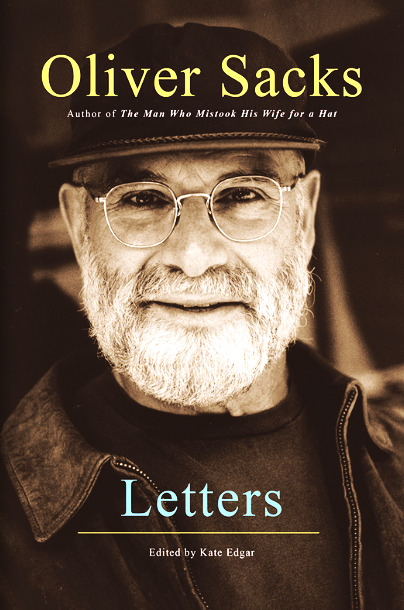
Letters by Oliver Sacks
The kaleidoscopic world and polymathic interests of a great neurologist brought to life in his correspondence
In 1960, Oliver Sacks, a 27-year-old University of Oxford graduate, arrived in San Francisco by Greyhound bus. Born in Cricklewood, London, Sacks spent the better part of his 20s training to be a doctor, but came to feel that English academic medicine was stifling and stratified. A “tight and tedious” professional ladder, he thought, was the only one available to aspiring neurologists like him.
A young queer man with a growing interest in motorcycle leather, Sacks had other reasons to leave. The revelation of his sexuality had caused a family rift: his mother felt it made him an “abomination”. And so he looked for escape across the Atlantic. America, for him, was the wide open west of Ansel Adams photographs; California was Steinbeck’s Cannery Row. The new world promised “space, freedom, interstices in which I could live and work”. This is how we meet Oliver Sacks in Letters: as an immigrant undertaking an internship at Mount Zion hospital, the first step in a career on US soil that would span another five decades.
Sacks’s San Francisco years also marked the beginning of his life as a writer. The city wasn’t an arbitrary choice. As he eagerly confessed to a one-time lover, Jenö Vincze, his true motivation for travelling to California was to force a meeting with an artistic idol, the British-turned-Haight Ashbury poet, Thom Gunn. Gunn’s The Sense of Movement (1957) spoke to and stirred Sacks’s predilection for motorbikes. Moreover, it performed on Sacks the kind of private miracle only poetry can: it helped decode “the babble” of his emotional life. “There is a queer, colossally big London Jew called Wolf,” Gunn wrote to his partner in 1961, after first meeting Sacks (who used his middle name, Wolf, as a nom de guerre when frequenting the city’s gay bars, wise to its lycanthropic resonances). “[He] came out to be a doctor here because I live here.” Sacks shared his writing with Gunn, whom he found a ruthless but tender critic, later crediting the poet with first impressing on him that he had real literary talent; a pivotal moment for a man who would go on to publish a dozen books.
“I am not a good correspondent,” Sacks wrote to his parents in 1961, “because I speak and write at people rather than to them.” This is an apt summation of Letters: 52 years of outgoing mail sent (or left unsent) to family, friends, scientists, writers and later, fans and celebrities, a panoply of addressees as diverse as the subjects Sacks writes “at” them about. Unleashed in a self-described “volcanic logorrhoea” that typifies his writing style, these letters variously consider botany, etymology, entomology, geology, neurology, and literature; the tussle between xenophobia and xeniality in Star Trek; the “phantasmagoric-comic unconscious” of actor Robin Williams. Edited by Kate Edgar, who worked as Sacks’s editorial assistant for over 20 years, Letters represents a mere fraction of the total in his archives, which runs to more than 200,000 pages.
Many of the included letters are incomplete, with ellipses denoting gaps whose editorial logic we must take on faith, even when they occasionally appear to interrupt tantalising trains of thought. In a 1984 letter to Lawrence Weschler, for instance, Sacks’s conflicted reflections on strike action in hospitals that might put vulnerable patients at risk feel prematurely curtailed. Despite these excisions, Letters leaves one with the overwhelming impression of a brilliant and vivid mind, a man whose intellectual appetite was vast, and whose professional and creative passions – far from being the self-absorbed obsessions of a pedant – were first and foremost an act of reaching out, the means through which he sought to communicate with others, a “love affair with the world”.
Sacks is an endearing and entertaining prose stylist – inquisitive, often funny, never obtuse – and the organisation of Letters, separated into broadly thematic, chronological chapters with concise editorial introductions, provides narrative momentum. The resulting book is far more engaging than the unwieldy reference text for Sacks specialists it could have been. It might, in fact, serve as a more affecting autobiography than his On the Move (2015), which occasionally slides into sentimentality. Letters is crammed with off-the-cuff profundities, moments of elevated perception that briefly unriddle the more inscrutable aspects of human nature. Here he is on grief, after the passing of his mother in 1972, an emotive state he deems “so unlike depression: it is so filling and real and expanding and uniting and – (it sounds an almost blasphemous word) – nourishing”.
Letters also draws an illuminating line from Sacks’s neurological career to his unlikely emergence as a bestselling author. In the late 60s, having relocated to New York, Sacks treated a group of patients suffering from encephalitis lethargica, also known as “sleeping sickness”, with an experimental drug, L-dopa. This experience informed his second book, Awakenings (1973), which married scientific research with storytelling through case studies of his patients’ lives and their responses to the treatment – a hybrid genre that irritated his colleagues just as it struck a chord with general readers. The literary attention Awakenings received set Sacks on a course to public renown.
“Brevity has never been a quality of mine,” he wrote to Mrs Miller, a physical therapist who helped him regain mobility after a leg injury in 1974. Indeed superabundance – the instinct toward excess – is everywhere in these letters. As a man of 30, dallying with powerlifting, Sacks routinely bragged to his parents about his weight, how much he could lift, the amount he ate – “I love to shake the pavement as I walk, to part crowds like the prow of a ship.” At Mount Zion, special scrubs had to be made to accommodate his bulk, and he found himself in disfavour with his superiors for stealing patients’ food.
But his overconsumption wasn’t always dietary. During the following 10 years or so, Sacks took a prodigious amount of amphetamines and psychotropics – “every dose an overdose” – with one trip producing visions of the “neurological heavens” so intense it inspired him to write his first book, Migraine (1970). By the 80s, following Awakenings and an appearance on The Dick Cavett Show that boosted his profile, pumping iron and popping pills had been replaced by correspondence. “I receive at least fifty or sixty letters and phone-calls a day,” he told his father with the same pride he formerly felt after squatting 575lb, “and, if anything, this number is increasing!”
What was Sacks trying to satiate? His substance abuse, the workaholism that eventually displaced it, speaks of the addict’s need to fill or stuff a void, an effort to forestall the unbearable loneliness that might accompany a moment’s rest. And loneliness certainly runs through these pages. Sacks once felt that his very existence was only made tolerable by rejecting intimacy and becoming “impersonal or supra-personal”; relationships, he said, were a forbidden area for him.
Late in life, he cited internalised homophobia as the driving force behind this isolation, a heart-rending admission, given that he temporarily felt liberated from this oppressive “social matrix” during that short-lived 1965 love affair with Jenö. It wasn’t until 2008, after 30-odd years’ celibacy, that an epistolary meet-cute with the writer Bill Hayes precipitated a loving, intimate companionship, one that would last the remainder of Sacks’s life. It’s a touching if bittersweet moment that arrives towards the end of Letters, the coda to this portrait of a man who, half a century earlier, had travelled across the world hoping to meet a poet who might truly understand him.
Daily inspiration. Discover more photos at Just for Books…?
9 notes
·
View notes
Text
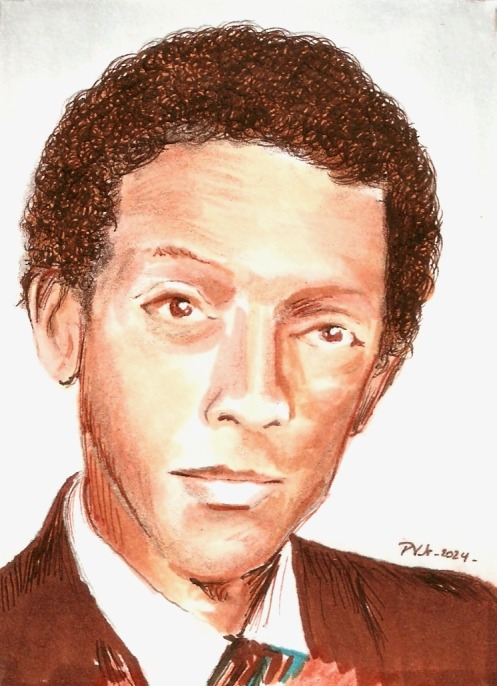
"I had no role models because nobody ever publicized them, not that they didn't exist. George Washington Carver and Percy Julian and others had preceded me in science, but nobody ever publicized their accomplishments, and, therefore, many of the minority students didn't know that they had a future in science because they figured it was something that was not for them."
After a bit of time away from this project to make room for convention appearances and other shows, I now return to the subject with a look at the life and accomplishments of physicist George Robert Carruthers, on this, what would have been his 85th birthday.
Born in 1939 Cincinnati, Carruthers's father was himself a civil engineer at Wright-Patterson AFB, but the family soon moved to the more rural location of Milford, Ohio. Carruthers was described as quiet and focused --intensely interested in space travel stories and comic books (my people!), and a devourer of the science articles in Collier's magazine (even penning a fan letter to Dr. Werner Von Braun, to which he received an unexpected and encouraging personal reply). At the age of ten Carruthers built his first telescope, constructed from lenses he obtained by mail order. After George's father died in 1952, the family moved to Chicago but his fascination with spaceflight did not diminish. Encouraged by wonderfully observant teachers, he eventually graduated from the University of Illinois, Urbana-Champaign in 1960, then earned his MS in in nuclear engineering in 1962, and then landed his PhD in aeronautical and astronautical engineering in 1964.
While working towards his PhD, Carruthers worked as a researcher and teaching assistant, studying plasma and gases. In 1964, Carruthers took a postdoctoral appointment with the Naval Research Laboratory (NRL) in Washington, D.C., focusing on far ultraviolet astronomy. In 1969 he received a U.S. patent for inventing a form of image converter; an instrument that detects electromagnetic radiation in short wavelengths. In 1970 his invention recorded the first observation of molecular hydrogen in outer space (which he described as "a very big deal at the time.")
Far and away (literally), Dr. Carruthers's greatest contribution to science is his development and construction of an ultraviolet electronographic telescope, which became the first (and to date still the only) astronomical instrument sent to the surface of the Moon; more properly known as the Far Ultraviolet Camera/Spectrograph. The camera was brought along on the Apollo 16 mission in 1972, set up to observe the Earth's geocorona (outermost atmosphere) from a vantage point never before possible. A short time later a variation on this very same camera was brought aboard Skylab to photograph the near approach of Comet Kohoutek, the first instance of a comet being recorded in ultraviolet. A flight backup of the Apollo 16 instrument, along with the original mission film canister, stood for many years as part of the lunar lander exhibit at the National Air & Space Museum, until it was later transferred to a more protected exhibit to guard against corrosion.
Dr. Carruthers's success and notoriety from the Apollo mission led to his creation of the Science & Engineers Apprentice Program, offering disadvantaged high school students the opportunity to work with scientists at the Naval Research Laboratory. His research into ultraviolet spectroscopy continued --in 1991 one of his ultraviolet cameras was used in multiple experiments aboard the Space Shuttle Discovery (STS-39). He retired from the NRL in 2002 and in 2003, was inducted into the National Inventor Hall of Fame. In 2013 was awarded the National Medal for Technology and Innovation by President Barack Obama. Dr. Carruthers died on Christmas Day, 2020.
10 notes
·
View notes